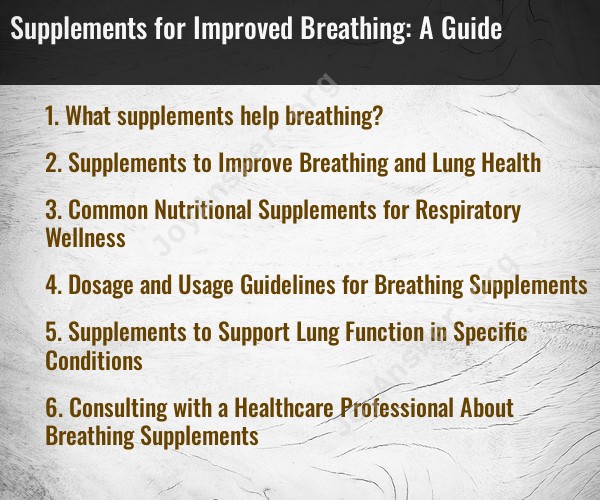What supplements help breathing?
Improved breathing is essential for overall health and well-being. While supplements are not a substitute for addressing underlying medical conditions, they may support respiratory health in some cases. Always consult with a healthcare professional before starting any new supplement regimen. Here are some supplements that may help with breathing and respiratory health:
Omega-3 Fatty Acids (Fish Oil): Omega-3 fatty acids, found in fish oil supplements, have anti-inflammatory properties and may help reduce inflammation in the airways, potentially improving breathing in individuals with respiratory conditions.
Vitamin C: Vitamin C is an antioxidant that may help reduce inflammation and support lung health. It may be beneficial for individuals with conditions like asthma or chronic obstructive pulmonary disease (COPD).
Vitamin D: Vitamin D is important for overall health, including respiratory health. Adequate vitamin D levels are associated with improved lung function. Some people with vitamin D deficiency may experience breathing difficulties.
Magnesium: Magnesium is involved in muscle and nerve function, and it can help relax the airway muscles. People with asthma may benefit from magnesium supplementation.
Quercetin: Quercetin is a flavonoid with antioxidant and anti-inflammatory properties. It may help reduce airway inflammation and improve breathing in people with asthma.
N-Acetylcysteine (NAC): NAC is a mucolytic agent that can help break down mucus in the airways, making it easier to breathe. It is sometimes used to treat conditions like chronic bronchitis.
Bromelain: Bromelain is an enzyme found in pineapple that has anti-inflammatory properties. It may help reduce inflammation in the airways.
Ginkgo Biloba: Ginkgo biloba is an herbal supplement that may improve blood circulation, potentially benefiting lung function.
Butterbur: Butterbur is an herbal supplement that has been used to relieve respiratory symptoms, particularly in individuals with allergies and asthma. It should be used with caution and preferably in a processed form, as raw butterbur can be toxic.
Probiotics: Probiotics support gut health, which is connected to immune and respiratory health. They may help reduce the risk of respiratory infections.
Caffeine: Caffeine, found in coffee and tea, acts as a bronchodilator and may temporarily improve airway function. However, it should be used in moderation.
L-Arginine: L-arginine is an amino acid that may help relax the airway muscles and improve lung function in individuals with conditions like asthma.
It's important to note that the effectiveness of these supplements may vary from person to person, and they are not a replacement for medical treatment for respiratory conditions. Additionally, some supplements may interact with medications or have side effects, so it's crucial to consult a healthcare professional before adding them to your routine, especially if you have a pre-existing respiratory condition. A healthcare provider can provide personalized advice and guidance based on your specific health needs.
Supplements to Improve Breathing and Lung Health
Certain supplements may play a supportive role in promoting respiratory wellness and improving lung function. However, it's crucial to note that supplements should not replace conventional medical treatment or lifestyle modifications such as quitting smoking, exercising regularly, and maintaining a healthy diet.
Common Nutritional Supplements for Respiratory Wellness
Several supplements have shown potential benefits for lung health:
Vitamin C: A powerful antioxidant that may protect lung cells from damage and support immune function.
Vitamin D: May enhance lung function and reduce inflammation in the airways.
Omega-3 Fatty Acids: May help reduce airway inflammation and improve lung function.
Magnesium: May relax the airways and improve breathing.
N-Acetyl Cysteine (NAC): An antioxidant that may help reduce mucus production and improve lung function in people with chronic lung conditions.
Quercetin: A flavonoid with potential anti-inflammatory and antioxidant properties that may benefit lung health.
Dosage and Usage Guidelines for Breathing Supplements
Dosage and usage guidelines for breathing supplements can vary depending on the specific supplement, individual factors, and underlying health conditions. It's always advisable to consult with a healthcare professional to determine the appropriate dosage and usage for you.
Supplements to Support Lung Function in Specific Conditions
Certain supplements may be particularly beneficial for individuals with specific respiratory conditions:
Asthma: Vitamin C, magnesium, and quercetin may offer additional support for asthma management.
Chronic Obstructive Pulmonary Disease (COPD): Vitamin D, omega-3 fatty acids, and NAC may be helpful for individuals with COPD.
Lung Infections: Vitamin C and zinc may support immune function and aid in recovery from lung infections.
Consulting with a Healthcare Professional About Breathing Supplements
Before starting any new supplements, especially if you have underlying health conditions or are taking medications, it's essential to consult with a healthcare professional. They can assess your individual needs, provide personalized recommendations, and monitor for potential interactions or side effects.
Remember, supplements should complement a healthy lifestyle, not replace it. Consult your doctor for individualized advice on the best supplements and lifestyle practices to support your respiratory health.












